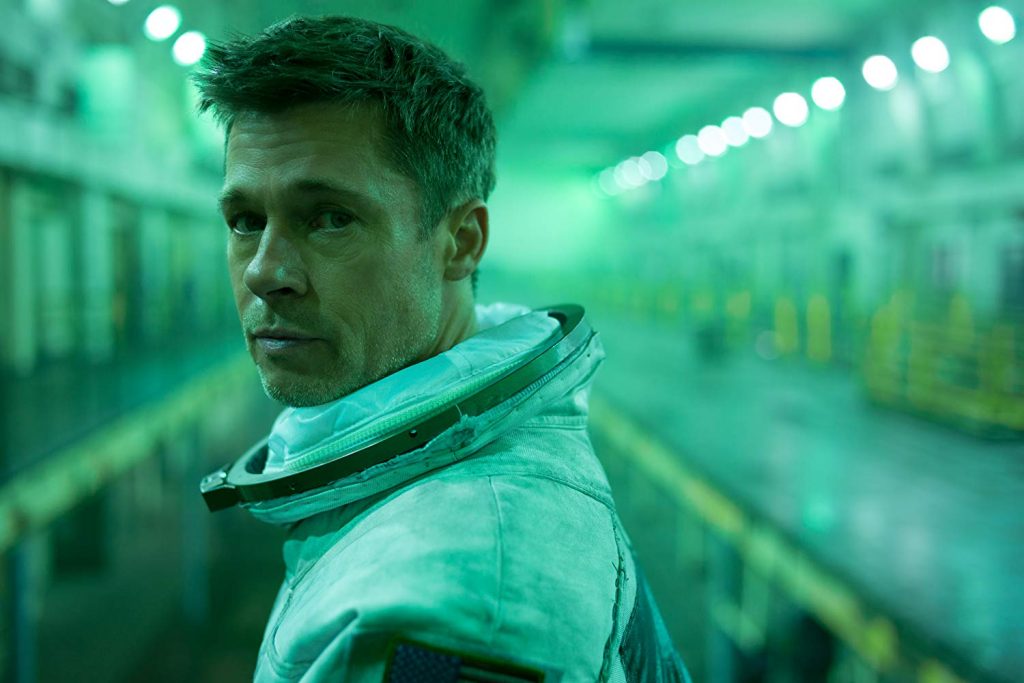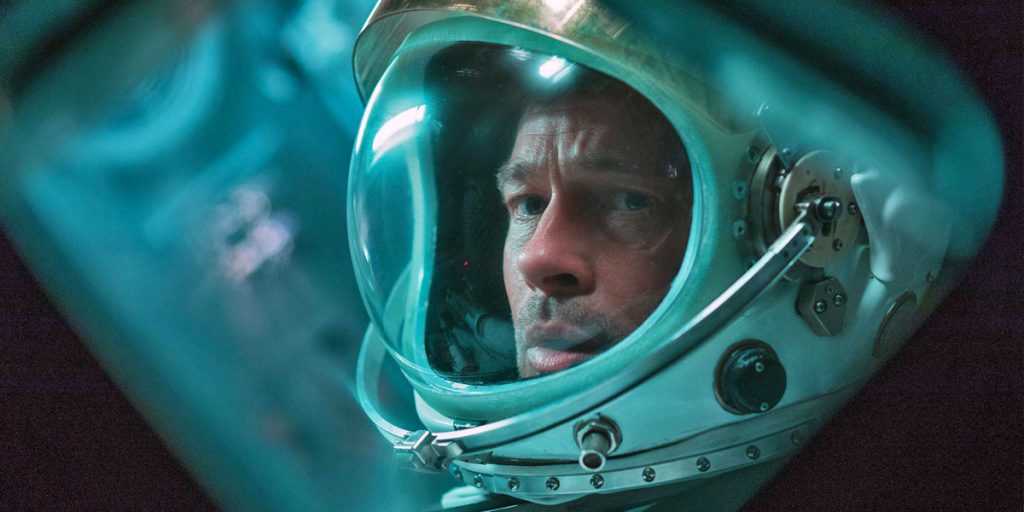Brad Pitt’s journey to Neptune is intentionally emotionless in James Gray’s Ad Astra, a stunning tale of identity, self-discovery and rebirth.
Ad Astra is an unusual sci-fi thriller. More introspective than it is action-packed, it revolves around a disillusioned astronaut who is sent to the solar system with the unlikely mission of finding his missing father, Clifford (Tommy Lee Jones), who has been deemed dead for thirty years but might actually be alive and well on Neptune. The premise for James Gray’s entire story is weak at best, as our protagonist’s unlikely journey to Neptune begins too soon in the film, not giving us enough time to get acquainted with his family history. Yet, there’s something else that makes Ad Astra‘s leading character stand out, just like there are other aspects that intrigue us about this visually stunning, intentionally emotionless journey.
Even with such an impossible task to complete, astronaut Roy McBride (Brad Pitt) is a fascinating character that surprises us in more than one way. Though his mission often seems unrealistic and at times even unnecessary, he is still a man who is haunted by the ghosts of his past. His poised, controlled, almost rehearsed attitude conceals a different, psychologically damaged side that sparks our interest. Not only that, but his conflicted relationship with his father is made even more captivating by the fact that McBride Senior was also an astronaut, and a beloved one at that. He was a commander that many regarded as a hero, in the best Star Trek tradition, and part of what compells us to watch the film is our desire to find out more about his past.
Ad Astra‘s complex protagonist is also an extremely compelling character on paper, yet it’s really hard to relate to him on the screen. If his narrating voice enables us to hear his thoughts, it also alienates him from the the audience in a way that soon makes him become kind of irritating. And, if his journey takes him to breathtaking landscapes that remind us of 2001: A Space Odyssey, it’s his actions that don’t really grab our interest as much as we hoped they would.
In a film that should have been hugely engaging on paper, not only do we find ourselves completely unfazed by Roy’s father’s predicament, but we soon realise that we don’t really care that much about our numb, self-destructive protagonist either. But this is entirely intentional. Because the main problem with McBride Junior is that he doesn’t really seem to be interested in living his own life. But there is a reason if we don’t really feel anything while we watch him try to uncover the truth about his father: it’s really hard to relate to a person who doesn’t even like himself.

And that is precisely the point of Ad Astra. At the centre of James Gray’s psychologically intense thriller is a character who is profoundly sad, alone and depressed, and who has lost his will to live. He doesn’t care about himself or what happens to him: all he does is go through the motions, and Brad Pitt is absolutely flawless at portraying a character who is emotionally disconnected from the world.
Roy’s mind is a dark, pessimistic place, and, at first, it’s hard to be in the darkness with him. But then the narrative unfolds, more elements of this surprisingly intimate story emerge and we slowly realise that Roy’s real journey has nothing to do with the solar system. As he mindlessly deals with unexpected challenges and becomes acquainted with a series of travel companions (from Donald Sutherland’s Colonel Pruitt to Ruth Negga’s Helen Lanthos), his narrating voice takes us deeper and deeper into his memories. We get used to witnessing everything with his cold, detached gaze, and he suddenly doesn’t seem so unrelatable anymore. Sure, his mission is still kind of hazy and the story develops in a way that is not entirely original, but it’s Ad Astra‘s lonely protagonist that holds the entire film together and makes the journey worthwile.
Ad Astra is not a perfect film. It asks us to follow a man we know nothing about on a journey we don’t fully believe in, and it does it without using its stellar cast as well as it could have. Its narrative structure sometimes comes across as overly simplified, and its turns of events are not entirely unpredictable. Its clever references are often thought-provoking, but they are also overshadowed by a cringeworthy sequence whose meaning is never really explored or developed in any way.
But it’s when we forget about its most superficial layer and delve into the depths of its protagonist’s mind that Ad Astra‘s meaning finally comes across, and this imperfect sci-fi thriller becomes an entirely different, much more insightful film. Because Ad Astra is also a beautiful story about identity and human interaction, one that gets under our skin and makes us slowly ponder upon the purpose in life. And, when it finally gives us an answer, it does it with the most meaningful two seconds of the entire movie – two seconds that encapsulate all the emotion the rest of the film lacked. And, if we look closely, it won’t be hard to find that one overwhelmingly emotional scene that changes everything, and that makes this journey worth taking.
Ad Astra premiered at the Venice Film Festival on 29th August, 2019 and was released worldwide on 20th September.

